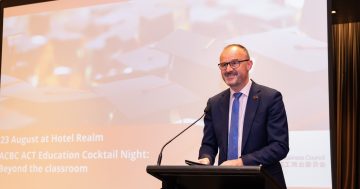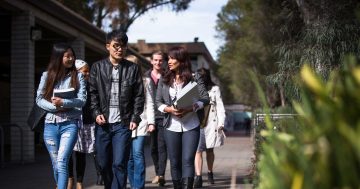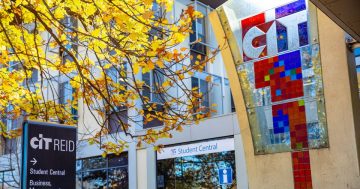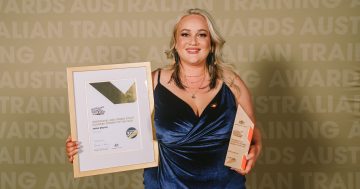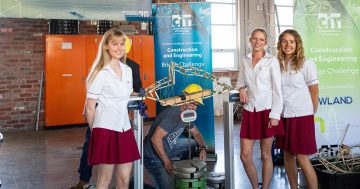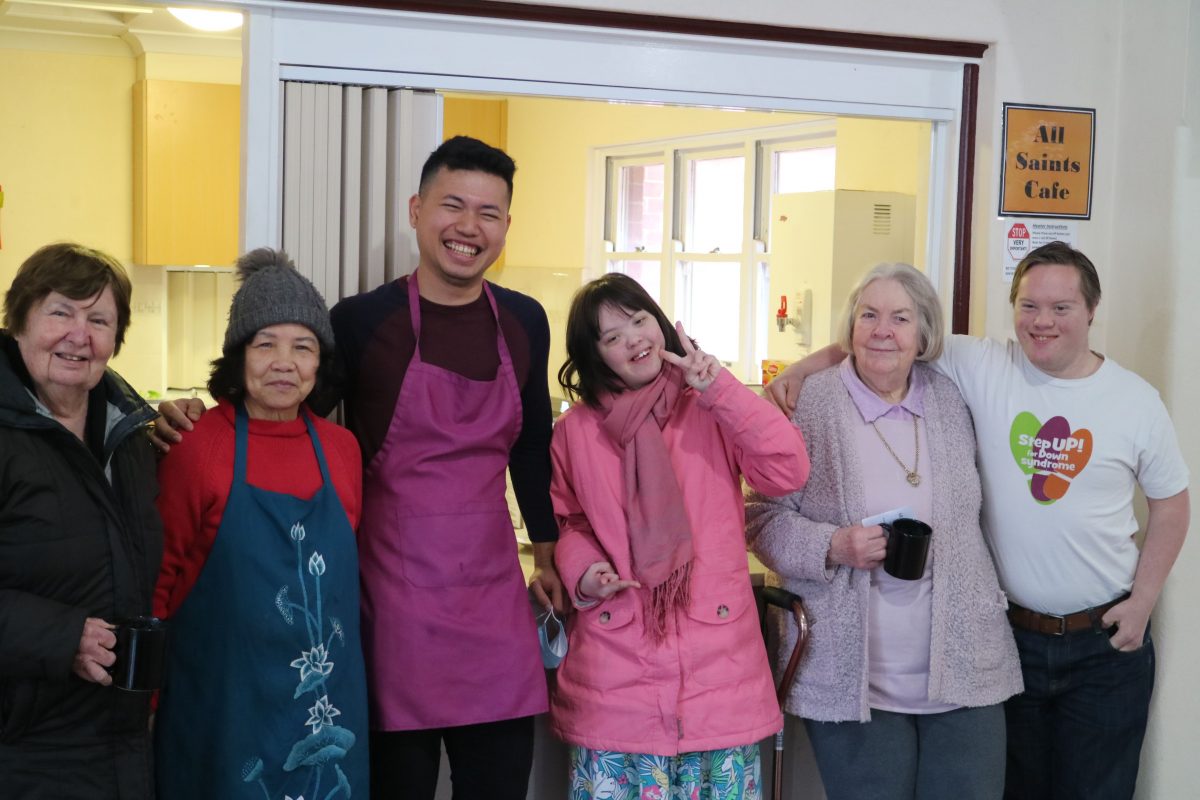
Tung with the All Saints Seniors cafe crew in Ainslie, where his English is no barrier to making a difference. Photo: Supplied.
Moving goalposts, impossibly high language bars and a visa processing logjam are holding back international student graduates who want to work when the skills shortage is biting across many industry sectors.
Human rights advocate Ivan Hinton-Teoh sponsored 29-year-old Thai man Suriya, known as Tung, to come to Canberra in 2019 to study Community Service at CIT, only for him to fall foul of what he says are unfair barriers erected by various federal departments, including Immigration.
Mr Hinton-Teoh says Tung has been working mulitiple jobs, including for the NDIS, for the past two-and-a-half years on a student visa which expired on Wednesday (24 August), but he has been unable to upgrade to a graduate visa due to a more demanding English language test.
Complicating his situation is that the peak body, the Australian Community Workers Association, does not recognise his diploma because CIT failed to have it accredited, something Ivan and Tung only became aware of midway through the course.
This means the federal government won’t recognise it unless he works for 12 months in the sector.
He is now applying for a six-month, stop-gap COVID visa, but he has a bridging visa so he can still work.
The problem with the COVID visa is that it restricts him to one employer, which may mean he ends up not working in his preferred area of community work.
It’s a tangle not of Tung’s making but emblematic of many international students’ plight in Australia, including his classmates, who are ready to help ease the nation’s skills crisis but are frustrated by bureaucratic barriers.
“So even though the ACT desperately needs people qualified in community service, even though he’s completed his diploma, he still doesn’t meet the standard that the federal government has established for being eligible for the critical skills list,” says Ivan.
He says Tung only had to rate 4.5 for his initial English test to begin his studies, but that bar has been raised to six for graduates, no matter the study or work level.
It is a costly business. Tests cost $300 a pop and visa applications $1500, and Tung has already sat for several, lifting his score to 5.5.
Students are paying language coaching colleges $1800 to help them pass the English test.
Tung also cannot travel on a bridging visa unless he pays an extra $200, and he hasn’t seen his family since starting his studies.
At the same time, Tung has had to pull back on work to focus on preparing for another English test.
Tung says it is a stressful situation when all he wants to do is help people and work towards being a case manager.
He chose Community Services because workers in that sector are desperately needed and he cares about people.
“I help people with everyday tasks and give them life skills,” he says.
“Now I can see that they can develop skills and they can do it themselves. It’s great to see that they can improve their lives.
“It just makes me want to help more and more people.”
Mr Hinton-Teoh says Tung has had no trouble communicating with his NDIS clients and has even made a video of one of his NDIS jobs supporting the epileptic operator of the Seniors Cafe at All Saints Church in Ainslie, which also employs a girl, Lucy, with Down Syndrome.
Lucy’s mother, Nguyet Barraclough, says Tung has been effective in supporting the local Ainslie community, working on the frontlines throughout COVID to provide essential services to vulnerable people.
“As we’re emerging from COVID, we should be recognising the enormous contribution of people like Tung and take advantage of their recently earned qualifications,” she says.
“As it stands, we’re sending recently qualified, competent professionals back to their home countries or forcing them into additional and unnecessary studies that take them out of the industry at a time where we desperately need their ongoing contribution.”
Ms Barraclough says Australia is facing real shortages of workers in the health, aged care and disability sectors.
“Tung is at the heart of our community project, which brings together and empowers disabled and aged people,” she says. “I encourage our visa decision makers to be responsive to real community needs so that he can continue his valued work in the Ainslie community.”
Mr Hinton-Teoh says an example of an unfair English test involves listening to people talking with the background noise of a nightclub, something even he struggled with.
He calls some of the components of the International English Language Testing System (IELTS) and PTE system very technical and confronting, and he had failed a few himself.
Processing times for international students have also blown out – 18 months for people trying to come to Australia, while Tung is facing four to eight months before his COVID visa application will even get looked at.
Mr Hinton-Teoh has written to Immigration Minister Andrew Giles and Member for Fenner Andrew Leigh on Tung’s behalf.
Registered Migration Agent Vinh Le says international students must pass an English test to be eligible for a student visa in Australia.
But after they complete their Diploma or Bachelor’s degree, they should be allowed to apply for their next 485 temporary graduate visa without having to re-sit the English test again, he says.
“These students have been in Australia for two years or more – they have already demonstrated up-front that they have sufficient English to study and work here,” Mr Le says.
“At a time when Australia needs more skilled migrants to help in the COVID-19 recovery process, we shouldn’t make it harder for these people to stay and contribute to our community.”
Migration reform is on the table at the Jobs and Skills Summit in Canberra on 1-2 September.
Meanwhile, students and graduates like Tung are stuck in a queue, facing considerable costs and changing visa conditions while the nation cries out for workers.












